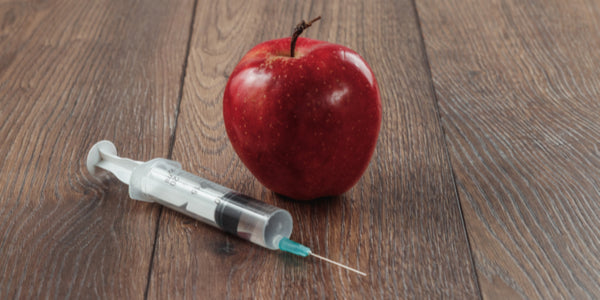
The HCG diet has an extensive history in the world of weight loss. Fast forward to today, the diet continues to linger in hopes to shed off weight fast.
However, nutrition experts warn the dangers of the HCG diet and its marked side effects.
What Is HCG?
HCG stands for human chorionic gonadotropin, which is hormone present at high levels in early pregnancy. It can be detected in maternal blood and urine and is the foundation of many pregnancy tests.
HCG is also a medication under the aliases Pregnyl, Novarel, and Ovidrel prescribed to improve fertility and treat sex hormone-linked conditions.
Smaller amounts of HCG are additionally produced in the pituitary gland, liver, and colon. Measuring human chorionic gonadotropin also shows benefit in a variety of cancers.
Moreover, HCG has become the heart of a dangerous weight loss diet.
The Upbringing of the HCG Diet
The diet was created by Dr. Albert Simeons in the early 1950s, which claims to:
• Lead to an average of one pound lost daily (As a comparison, it is recommended to lose no more than 1 to 3 pounds per week unless advised and supervised by a healthcare provider.)
• Burn stored fat over muscle
• Target fat primarily in the stomach, hips, and thighs
• Reset metabolism
• Blunt hunger while eradicating feelings of weakness
The diet consists of injections of human chorionic gonadotropin in conjunction with a severe caloric restriction (only 500 calories daily). According to the official manuscript, a "plan of normal course" details:
• 125 international units (IU) of injectable HCG daily (except during menstruation)
• Until 3rd injection forced feeding
• After 3rd injection, 500 calorie diet to be continued until 72 hours after the last injection
• For the following 3 weeks, all foods allowed except starch and sugar in any form (careful with very sweet fruit)
• After 3 weeks, very gradually add starch in small quantities, always controlled by morning weighing
Dr. Simeons advised distributing the 500 calories into two meals, which consisted of:
• 100 grams of veal, beef, chicken breast, fresh white fish, lobster, crab, or shrimp with the removal of all visible fat and skin (salmon, eel, tuna, herring, dried or pickled fish are not allowed)
• One type of vegetable only to be chosen from the following: spinach, chard, chicory, beet-greens, green salad, tomatoes, celery, fennel, onions, red radishes, cucumbers, asparagus, cabbage
• One breadstick or one Melba toast
• An apple or a handful of strawberries or one-half grapefruit or orange
Followers of the diet could also drink "tea or coffee in any quantity without sugar. Only one tablespoonful of milk allowed in 24 hours. Saccharin or Stevia may be used." Patients were encouraged to drink about 2 liters of fluid daily.
HCG and Weight Loss
Researchers and dieters alike have been interested in the outcomes of HCG and weight loss for decades. In fact, 1976 research published in the Journal of American Medical Association examined the effectiveness of human chorionic gonadotropin versus placebo in a weight reduction program.
Amongst the 200 participants, researchers found there was no statistically significant difference between those receiving HCG versus placebo during any phase of this study.
In 1977, researchers examined human chorionic gonadotropin on the treatment of obesity. Six hospitalized women considered to be obese were placed on 500 calorie diets and provided 125 IU of HCG intramuscularly daily for 30 days. Another five obese women received injections of diluent only and consumed identical diets during the same trial period period.
The results?
Not so surprisingly, mean weight loss in the HCG-treated group was nearly identical to that achieved by women given the placebo, with no differences in the reduction of triceps skinfold thickness or circumferential body measurements of the chest, waist, hips, and thighs.
What's more, patterns of change of a variety of plasma and urine substrates, electrolytes, and hormones were similar in the two groups and consistent with semi-starvation and weight loss. These results indicated HCG offers no advantage over calorie restriction in promoting weight loss.
The research fairs consistent with each passing decade, with an eventual 1995 meta-analysis concluding, "There is no scientific evidence that HCG is effective in the treatment of obesity; it does not bring about weight-loss of fat-redistribution, nor does it reduce hunger or induce a feeling of well-being."
Despite the evidence pointing to the ineffectiveness of HCG throughout the years, a 2007 book resurged the attention of the diet. Even with the author being jailed for 10 years over weight-loss book claims and the FDA asserting that HCG diet products are illegal, the diet continues to spark curiosity to this day.
But shining light on HCG side effects and dangers may deter prospective users.
Dangers of the HCG Diet
HCG diet dangers are extensive, as there are side effects linked to severely restrictive diets and human chorionic gonadotropin in itself.
Restrictive diets can immediately lead to:
• Extreme hunger
• Feeling cold
• Dizziness
• Fatigue
• Irritability
• Dehydration
• Changes in bowel patterns, including diarrhea and constipation
Especially if unsupervised by a medical professional, rapidly losing weight in a matter of weeks can further place the risk of:
• Losing muscle mass, especially in the absence of adequate protein
• Slowing down metabolism, even after the diet has terminated
• Vitamin and mineral deficiencies
• Gallstones
• Loose skin and stretch makes
• Menstrual irregularities in females
• Yo-yo dieting, further placing the risk of heart disease and premature death
In addition to the consequence of rapid weight loss, HCG side effects are abundant and include, but not limited to:
• Rash
• Abdominal pain
• Fever
• Pain at the injection site
• Headache
• Nausea and vomiting
• Mouth ulceration
• Upper respiratory tract infections
• Depression
• Fatigue
• Fetal harm during pregnancy
Final Thoughts
Truly, the extensive list of HCG side effects and diet dangers far exceeds any sort of benefit of implementing the diet. Always remain cautious of diets making large claims. Not only can they take a hit to your wallet, but be dangerous to health.
So, if someone tells you that the HCG diet is the way to go, remember the facts: Starving your body is never the answer. Our bodies need nutrition to function and it purely cannot maintain successful weight loss without it.
By skipping the hormones and eating properly balanced meals, you can avoid the HCG diet dangers and lose weight the safe and smart way!






